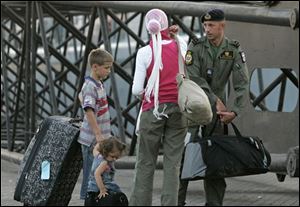
Hundreds of Europeans flee as Americans stew at slow U.S. evacuation
7/18/2006
American citizens wearing protective head gear wait to board a U.S. Marines helicopter at the U.S. Embassy in Aukar at the northern edge of Beirut to evacuate them to Cyprus.
BEIRUT A cruise ship sailed into Beirut late today to begin shuttling thousands of Americans to safety from Mideast fighting, amid fierce criticism that the U.S. effort had lagged behind Europe s.
The commander of the Fifth Fleet said the ship would begin boarding evacuees at dawn.
We re trying to move quickly, trying to move large numbers of people as fast as we can, said Vice Adm. Patrick Walsh, the top U.S. naval officer in the Middle East. A larger commercial vessel also would be used, he said.
A Pentagon spokesman said the U.S. government was considering hiring as many as four more cruise ships to carry Americans.
Thousands of Europeans already have fled the country, which is under fierce Israeli air attack.
Earlier in the day, 320 Americans, mostly children, students and the elderly, left by military helicopter and a European ship. U.S. Ambassador Jeffrey D. Feltman told The Associated Press more than 1,000 Americans would depart Wednesday.
The ambassador said the evacuation s slow start was intended to safeguard Americans.
We at the embassy don t have the experience to move a lot of people, Feltman said. Luckily, the U.S. government does, he said. Security and safe travel were what s on our minds.

A British Royal Navy pilot helps British nationals with their luggage as they board the British destroyer HMS Gloucester at the Beirut seaport in Lebanon for evacuation to Cyprus.
An estimated 8,000 of the 25,000 Americans in Lebanon want to leave.
European countries began moving hundreds of their citizens to Cyprus Monday.
Nearly 1,000 were on a Swedish-chartered ship that left Beirut today, and a British warship and Greek frigate transported nearly 600 of those countries nationals away from Lebanon.
Six chartered passenger ships were to be in position off the coast of Lebanon on Wednesday to begin evacuating up to 30,000 Canadians stranded in the crossfire.
Authorities intend to evacuate some 4,500 a day, ferrying them to Cyprus. There are as many as 50,000 Canadian-Lebanese in Lebanon but it was unclear how many would want to be evacuated.
Pentagon spokesman Bryan Whitman said the primary concern was that people be taken out in a safe and organized manner. He said the Beirut port was working at a higher capacity than normal, making it challenging to get ships from various countries in and out.
The Orient Queen, the ship that docked late today, was carrying a number of Lebanese passengers, and we needed to do some coordination to allow them to pass through the Israeli naval blockade of Lebanon and leave the ship in Beirut, Whitman said.
Outside the gates of the U.S. Embassy, Californian Elie Kawkabani, who lives in Beirut, was angry about the delay.
The embassy is providing us with sketchy information and they are being rude to us here at the gate, he said. We have other options, like leaving through Syria, but they keep stringing us along day after day.
White House spokesman Tony Snow said the United States has determined it was not safe to travel by road, adding: We understand the anxieties of people in Lebanon.
After criticism from Congress, the State Department dropped plans to ask Americans to pay for their rides on commercial vessels.
Earlier, authorities planned to make Americans sign a note pledging to reimburse the U.S. government before they got on board. They were charging the price of a single commercial flight from Beirut to Cyprus usually $150-$200, although officials refused to specify.
Before the State Department dropped the plan, Snow defended it by saying the government has to charge evacuees because of a 2003 law.
I dare say that it s something that is causing heartburn for a number of people, but it s the law, he said.
House Democratic leader Nancy Pelosi objected, saying it was not Congress intent to prevent evacuations by making people sign a commitment to pay.
A nation that can provide more than $300 billion for a war in Iraq can provide the money to get its people out of Lebanon, Pelosi told CNN.
Some other European countries, including the Netherlands, said they asked for repayment but did not expect it in many cases.
The Orient Queen which can carry 876 passengers had been on a cruise of the eastern Mediterranean with 400 people aboard, mostly Lebanese. It was supposed to have returned to Beirut three days ago but was unable to do so because of the Israeli blockade, a U.S. official in Beirut said. While it was in Cyprus, it was chartered by the U.S. to evacuate Americans.
Speaking to Pentagon reporters from Bahrain, Walsh said there were no plans yet to put U.S. Marines ashore in Beirut for security.
The 24th Marine Expeditionary Unit, conducting exercises in the Red Sea, was ordered into the waters off Lebanon to help with the evacuation. U.S. ships expected in the area include the amphibious assault ships USS Iwo Jima, USS Nashville and USS Whidbey Island.
The ships, part of a five-vessel Navy unit, carry a battalion of Marines with a helicopter squadron. The ships also have hospital facilities.
European nations also intensified their evacuation effort, moving thousands out of harm s way.
Britain s HMS Gloucester departed with 180 people on board, the vast majority of them British. Another Royal Navy warship, York, was offshore.
Up to 3,000 Britons want to be evacuated, said British Ambassador James Watt. He called today s departures an experiment, adding that there will be more and in bigger numbers in coming days, using navy and chartered ships.
A Greek navy frigate steamed out of Beirut harbor with about 400 Greeks, Cypriots and other Europeans aboard.
Read more in later editions of The Blade and toledoblade.com.